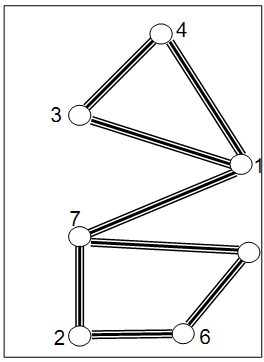|
Description
Each of the M lanes of the Park of Polytechnic University of Bucharest connects two of the N crossroads of the park (labeled from 1 to N). There is no pair of crossroads connected by more than one lane and it is possible to pass from each crossroad to each
other crossroad by a path composed of one or more lanes. A cycle of lanes is simple when passes through each of its crossroads exactly once.
The administration of the University would like to put on the lanes pictures of the winners of Regional Collegiate Programming Contest in such way that the pictures of winners from the same university to be on the lanes of a same simple cycle. That is why the administration would like to assign the longest simple cycles of lanes to most successful universities. The problem is to find the longest cycles? Fortunately, it happens that each lane of the park is participating in no more than one simple cycle (see the Figure).  Input
On the first line of the input file the number T of the test cases will be given. Each test case starts with a line with the positive integers N and M, separated by interval (4 <= N <= 4444). Each of the next M lines of the test case contains the labels of
one of the pairs of crossroads connected by a lane.
Output
For each of the test cases, on a single line of the output, print the length of a maximal simple cycle.
Sample Input 1 7 8 3 4 1 4 1 3 7 1 2 7 7 5 5 6 6 2 Sample Output 4 Source |
求一个无向图里的最大环,额,开始用的邻连接矩阵,超内存了无数次,
只能转向邻接表啦=。=,话说我比赛的时候wa了4发,不能再爱了。顺便学了邻接表。
#include<iostream>
#include<cstdio>
#include<cstring>
#include<algorithm>
#include<limits.h>
using namespace std;
const int maxn=4500;
struct node{
int to,next;
}e[maxn<<2];
int f[maxn];
int head[maxn];
int n,m,num;
int ans;
void build(int u,int v)
{
e[num].to=v;
e[num].next=head[u];
head[u]=num;
num++;
}
void dfs(int cur,int pos)
{
if(f[cur])
{
if(ans<pos-f[cur])
ans=pos-f[cur];
return ;
}
f[cur]=pos;
for(int i=head[cur];i!=-1;i=e[i].next)//记录的是cur(起点)到终点的边的集合
dfs(e[i].to,pos+1);
}
int main()
{
int t,u,v;
scanf("%d",&t);
while(t--)
{
num=0;
memset(head,-1,sizeof(head));
memset(f,0,sizeof(f));
scanf("%d%d",&n,&m);
while(m--)
{
scanf("%d%d",&u,&v);
build(u,v);
build(v,u);
}
ans=0;
dfs(1,1);
if(ans<3)
ans=0;
printf("%d\n",ans);
}
return 0;
}
#include<iostream>
#include<cstdio>
#include<cstring>
#include<algorithm>
#include<limits.h>
using namespace std;
const int maxn=5000;
int visit[maxn][maxn];
int mp[maxn][maxn];
int n,m,sum;
bool flag;
void dfs(int k,int s,int p)
{
if(k==p&&s)
{
if(s>sum)
sum=s;
flag=true;
}
if(k==p&&s<=sum&&s)
{
flag=true;
return ;
}
if(flag)
return ;
for(int i=1;i<=n;i++)
{
if(mp[k][i]&&!visit[k][i])
{
visit[k][i]=visit[i][k]=1;
dfs(i,s+1,p);
visit[k][i]=visit[i][k]=0;
}
}
}
int main()
{
int t,u,v;
scanf("%d",&t);
while(t--)
{
scanf("%d%d",&n,&m);
memset(mp,0,sizeof(mp));
for(int i=1;i<=m;i++)
{
scanf("%d%d",&u,&v);
mp[u][v]=mp[v][u]=1;
}
sum=0;
for(int i=1;i<=n;i++)
{
memset(visit,0,sizeof(visit));
flag=false;
dfs(i,0,i);
}
printf("%d\n",sum);
}
return 0;
}
POJ 3895 Cycles of Lanes,布布扣,bubuko.com
原文:http://blog.csdn.net/u013582254/article/details/38352819